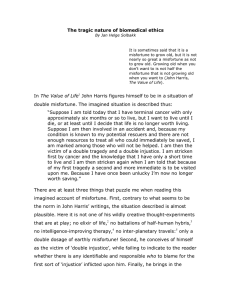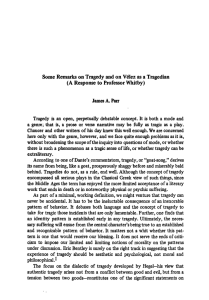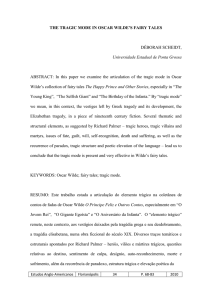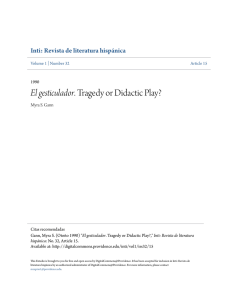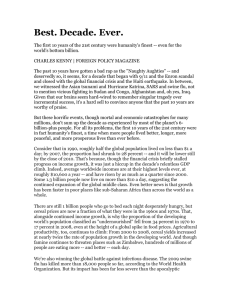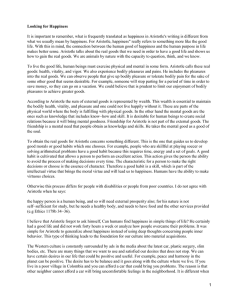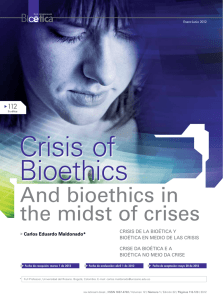1 The Tragedy of Tragedy John Harris Jan Helge Solbakk pays me
Anuncio
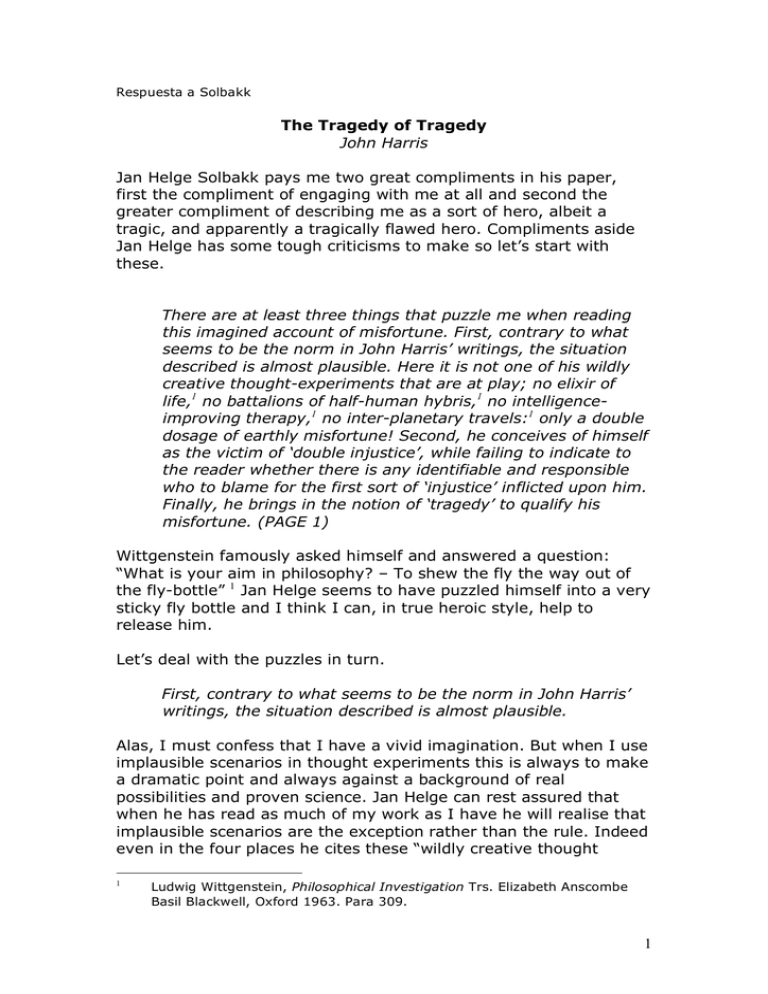
Respuesta a Solbakk The Tragedy of Tragedy John Harris Jan Helge Solbakk pays me two great compliments in his paper, first the compliment of engaging with me at all and second the greater compliment of describing me as a sort of hero, albeit a tragic, and apparently a tragically flawed hero. Compliments aside Jan Helge has some tough criticisms to make so let’s start with these. There are at least three things that puzzle me when reading this imagined account of misfortune. First, contrary to what seems to be the norm in John Harris’ writings, the situation described is almost plausible. Here it is not one of his wildly creative thought-experiments that are at play; no elixir of life,1 no battalions of half-human hybris,1 no intelligenceimproving therapy,1 no inter-planetary travels:1 only a double dosage of earthly misfortune! Second, he conceives of himself as the victim of ‘double injustice’, while failing to indicate to the reader whether there is any identifiable and responsible who to blame for the first sort of ‘injustice’ inflicted upon him. Finally, he brings in the notion of ‘tragedy’ to qualify his misfortune. (PAGE 1) Wittgenstein famously asked himself and answered a question: “What is your aim in philosophy? – To shew the fly the way out of the fly-bottle” 1 Jan Helge seems to have puzzled himself into a very sticky fly bottle and I think I can, in true heroic style, help to release him. Let’s deal with the puzzles in turn. First, contrary to what seems to be the norm in John Harris’ writings, the situation described is almost plausible. Alas, I must confess that I have a vivid imagination. But when I use implausible scenarios in thought experiments this is always to make a dramatic point and always against a background of real possibilities and proven science. Jan Helge can rest assured that when he has read as much of my work as I have he will realise that implausible scenarios are the exception rather than the rule. Indeed even in the four places he cites these “wildly creative thought 1 Ludwig Wittgenstein, Philosophical Investigation Trs. Elizabeth Anscombe Basil Blackwell, Oxford 1963. Para 309. 1 experiments” are a tiny fraction of the examples chosen to illustrate points or to provide the evidence to back up the arguments. Indeed I challenge him to analyse the examples I use a provide statistics. The rest, I am ashamed to confess, are plausible beyond belief. Second, he conceives of himself as the victim of ‘double injustice’, while failing to indicate to the reader whether there is any identifiable and responsible (sic) who to blame for the first sort of ‘injustice’ inflicted upon him. Here is certainly something we can disagree about. Jan Helge seems to believe that tragedies must be man made and that there must be someone responsible for a tragic outcome. Jan Helge doesn’t offer an argument for this claim and it seems simply wrong to me, both because it is contrary to normal usage and because it lacks any theoretical support. It makes perfect sense to say that it is unjust when a baby is born handicapped, unjust when lighting strikes my house and not that of my neighbour (assuming we are both equally virtuous or equally vicious) and that it is doubly unjust when lightening strikes in the same place twice! “What have I done to deserve this?” is a familiar cry of those victims of brute bad luck. Premature death for example seems an injustice to most who experience it both because they believed that they, along with everyone else, should have the chance of a full and happy life and also because when some suffer misfortune while other equally deserving or equally undeserving people do not, this is unjust it is also unfair. But for present purposes I am not interested in the distinction between these two, sometimes interchanged but not interchangeable, concepts. When I have done nothing to deserve a misfortune it is unjust when it strikes me, regardless of whether or not the source of the misfortune is man, God, nature or mischance or Jan Helge Solbakk. Of course when I am unjustly criticised by Jan Helga this is really a misfortune of tragic proportions, as we shall now see.2 Finally, he brings in the notion of ‘tragedy’ to qualify his misfortune. Jan Helge thinks I don’t know a tragic event when I see one and he calls in aid no less a master than Aristotle whom he quotes as saying: Tragedy is a representation of a serious, complete action which has magnitude, in embellished speech, with each of its elements [used] separately in the [various] parts [of the 2 I hope the word and the practice of irony translates well into Norwegian? 2 play]; [represented] by people acting and not by narration; accomplishing by means of pity and terror the catharsis of such emotions.(PAGE 2) Aristotle here refers to a tragedy in dramatic and dramatised form, - not the sort of tragic event that I was talking about. Aristotle’s account of Tragedy is interesting, if flawed, but this is not the place for that discussion. Obviously a single event will not be “a representation of a serious, compete action… [represented] by people acting” etc. Jan Helge is making the mistake of conflating two uses of the word “tragedy” as it occurs in a natural language. The sense in which I was using “tragedy” was to characterize an event as tragic when the consequences for the individual who experiences the event are tragic in the sense that they are a “disastrous and undeserved misfortune and one that is often also a life changing event”, Jan Helga on the other hand is speaking of “a tragedy” that is a dramatic scene or indeed an entire play in which actors, enact a tragic story, and do not merely fall victim to a tragic event. I agree with Jan Helge that the sort of tragedy which interests him, and interested Aristotle, (and indeed myself in other contexts), is more interesting, more satisfying and more complete than a tragic event. However tragic events do occur, sometimes even in tragedies of the kind written by Sophocles and Shakespeare. And when tragic events occur in tragic drama they are tragic in two senses: they involve disastrous misfortune and are a part of the sort of acted representation of which Aristotle spoke and which Sophocles wrote. If Jan Helge can call in aid Aristotle, I can appeal to an equally classical source and one that will resonate with contemporary readers: the famous Manchester band the Bee Gees and their account of Tragedy3: Tragedy When the feelings gone and you can’t go on Its Tragedy When the morning cries and you don’t know why Its hard to bear With no one to love you you’re Goin nowhere When you lose control and you got no soul Its Tragedy 3 http://www.lyricsfreak.com/b/bee+gees/tragedy_20015660.html. Songwriters: Gibb, Maurice Ernest;Gibb, Robin Hugh;Gibb, Barry. 3 From the Gibb narrative it is clear that tragedy can, in ordinary and extraordinary language, be many kinds of disastrously misfortunate event. I rest my case. But only the case so far made, for Jan Helge has other fish to fry, namely me! It is to this genuinely tragic side of John Harris’ career as a bioethicist I shall now turn my attention. That is, I shall try to show how Aristotle’s conception of tragedy may be used to display John Harris’ role in contemporary bioethics as the role of a tragic hero, and notably as one of the most prominent heroes within his tradition. In this way I also hope to give due credit to what I consider the most important contribution of Harris and his tradition to contemporary bioethics: the disclosure of the possibilities as well as of the fragility and insufficiency of rational forms of moral reasoning. (PAGE 5) In the following I suggest to look for cues in our hero’s story that may fit with the characteristics of the third form of tragic action; i.e. an act done in ignorance followed by subsequent recognition of its dreadful effects. This brings me back to John Harris’ overconfidence in purist forms of reasoning and his tendency to constantly overlook the formative role of contingent facts in the shaping and perception of moral conflicts. Throughout his career as a bio-ethicist our hero has confidently acted as though empirical data counts for nothing in the clarification and or resolution of ethical controversies. Such neglect does not only imply a reductionist handling of moral issues; in the long run it may also develop into a more serious form of moral blindness: Blindness to the incarnate nature and opacity of our rational and moral capabilities. (PAGE 6) Jan Helge says specifically that Throughout his career as a bioethicist our hero has confidently acted as though empirical data counts for nothing in the clarification and or resolution of ethical controversies. This is a very comprehensive claim and a very serious indictment. So serious is it that all I can say in response is that it is simply not true, false in every respect. So devoted am I to facts, and indeed to the proper and important place of evidence in bioethics, that I take the strongest possible issue with the fact of this gross distortion of the facts by Jan Helge for which he offers no evidence. So that while he does cite places where I use thought experiments and does acknowledge that my work is full of interesting arguments and is consistent, the facts that he needs are 4 an analysis of some reasonable proportion (a statistically relevant sample) of my work and the frequency with which facts of various sorts (evidence in other words) appear in their proper place of supporting or illustrating argument. This he not only fails to provide but shows not the slightest awareness of the fact that it might be required to justify what are otherwise unsupported claims and empty rhetoric. This raises an important point about methodology in bioethics to which I will return in a moment. It also shows that Jan Helge is rather cavalier with the facts himself. My books are crammed with facts: facts about the causes and effects of pain, suffering and …yes…tragedy, real tragedy, factual tragedy, actual tragedy (not the literary kind) inflicted on human beings by vicious, stupid or negligent people or by the brute forces of nature, forces that might so often have been tamed or diverted by human intelligence and ingenuity. My writings are full of suggestions as to how this terrible waste of life, liberty and happiness might be stemmed and life made better for all. They are also full of facts about human practices: the practice of medicine, the practice of science, the practice of government and of policy. I have set out the details of policies and practices concerning organ and tissue transplants that cost lives and of suggestions for saving those lives, details of reproductive technologies that might enlarge human choice and human welfare, and enable healthier children to be born and live long lives, facts about genetics and biotechnology, facts about what the law is and how it might be changed for the better. My writings are bursting with empirical data of all sorts and as the reader can see I am bursting with righteous, if not heroic, indignation about this inattention to the facts by Jan Helge. I admit there is what Jan Helge himself proudly calls “opacity” in Jan Helge’s “rational and moral capabilities” and I confess that I see no virtue in opacity. I do not think a fair reader of my work could claim that I exhibit “complete lack of interest in the messy world of contingency”. It is the messy world of contingency that I have tried to combat and ameliorate my entire professional life. I may not have been very successful, particularly in persuading Jan Helge, but I have certainly and consistently tried. Let’s look at one of Jan Helge’s examples of my complete lack of interest in the messy world of contingency: These observations we may now use to assess the ethicodidactic potential of some of John Harris’ imaginary situations and thought experiments, including the example of double misfortune already mentioned. This brings me first to a comment he makes about the value of empirical facts in gene therapy research that I take as a telling indication of the 5 prominent bioethicist’s complete lack of interest in the messy world of contingency: “Gene therapy may of course be scientifically problematic in a number of ways and in so far as these might make the procedure unsafe we would have some reason to be suspicious of it. However, these problems are ethically uninteresting and I shall continue to assume that gene therapy is tried and tested from a scientific perspective”.4 It should not be necessary to explain this to a fellow philosopher, but when I say in the passage quoted above that: , these problems are ethically uninteresting and I shall continue to assume that gene therapy is tried and tested from a scientific perspective I am making two familiar and important points. The first is that in so far as a procedure is unsafe, that fact alone, in many circumstances, constitutes a sufficient reason not to use it or approve its use. My point in saying therefore that safety and efficacy are “philosophically uninteresting” is not to dismiss their vital importance but to note that if we wish to be clear about whether or not there are any principled ethical objections to the use of new technology which do not boil down to issues of safety and efficacy, we need in short, to assume safety and efficacy and then see if there is anything else left,5 once safety and efficacy are assumed, to worry about from an ethical or indeed from a social perspective. So it is not, absolutely not, that I dismiss “the value of empirical facts in gene therapy research”; rather it is that if those facts indicate that the procedure is neither safe nor effective, or that the balance of safety and efficacy is not such that a sane person would risk the procedures for the sake of the benefits in the circumstances imagined, then there is nothing more useful to sayfor the moment about the facts. The point of me or anyone else nonethe-less trying to say something about the principles or the ethics involved is that we know that safety and efficacy very often improve over time with new science and innovation. We therefore need to imagine a point where these practical problems have been solved in order try to decide whether there are further ethical issues that might (safety and efficacy notwithstanding) give us pause in introducing new technologies into human physiology or human society or indeed to attempt to transform both into something new and better.6 Of course safety and efficacy are relative to the threats 4 J. Harris, “Is Gene Therapy a Form of Eugenics?”, Bioethics, vol. 7, no. 2/3, 1993, pp. 178-187, reprinted in H. Kuhse. P. Singer (Eds.), Bioethics. An Anthology, Blackwell Publishers, 2001, (pp. 165-170), p. 169. 5 I apoplogise to readers for the necessity of the added emphasis. 6 See John Harris Enhancing Evolution, Princeton University Press, Princeton and Oxford 2007. 6 we face and a terminal cancer patient will typically be willing to take more risks in the hope or prolonged survival that will a healthy young adult with a remedy for the common cold. One further point about method in bioethics needs to be made. As far as I am aware Jan Helge is not a social or natural scientist, and neither am I. What then does he or I have to offer in assessment of the risks and benefits of science? We have, or we should have, some skill in ethical analysis, in combining evidence and argument in trying to arrive at a view of science and innovation and of society and human nature which is both safe, efficacious and ethical. When we read Jan Helge’s essay to which this is a response, we interestingly find a plentiful lack of evidence from the “ messy world of contingency”, and a total lack of apparent interest in any facts at all. We find instead reference to literary and philosophical luminaries, Aristotle, Sophocles and others. Were I analysing Jan Helge’s work, at least in its present incarnation, I would have grounds for complaint more palpable than Jan Helge, about the disregard of facts; not least the facts concerning the content of the work of mine he criticises. That said I am grateful for this opportunity to set the record straight, flattered to be called, however ironically, a hero and a prominent one, and proud of my record of both rational argument, and attention to the facts and, where necessary as now, proud of not letting a challenge go unanswered. 2721 7
